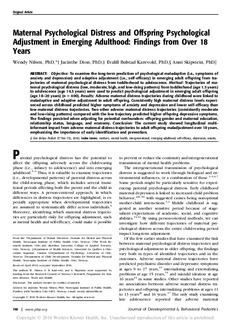Maternal Psychological Distress and Offspring Psychological Adjustment in Emerging Adulthood: Findings from Over 18 Years
Peer reviewed, Journal article
Published version
Permanent lenke
http://hdl.handle.net/11250/2447164Utgivelsesdato
2016Metadata
Vis full innførselSamlinger
- Artikler [5061]
- Publikasjoner fra CRIStin FHI [7536]
Originalversjon
Journal of Developmental and Behavioral Pediatrics. 2016, 37 (9), 746-752. 10.1097/DBP.0000000000000365Sammendrag
Objective: To examine the long-term prediction of psychological maladaptive (i.e., symptoms of anxiety and depression) and adaptive adjustment (i.e., self-efficacy) in emerging adult offspring from trajectories of maternal psychological distress from toddlerhood to adolescence. Method: Trajectories of maternal psychological distress (low, moderate, high, and low-rising patterns) from toddlerhood (age 1.5 years) to adolescence (age 14.5 years) were used to predict psychological adjustment in emerging adult offspring (age 18–20 years) (n 5 400). Results: Adverse maternal distress trajectories during childhood were linked to maladaptive and adaptive adjustment in adult offspring. Consistently high maternal distress levels experienced across childhood predicted higher symptoms of anxiety and depression and lower self-efficacy than low maternal distress trajectories. Two other adverse maternal distress trajectories (consistently moderate and low-rising patterns) compared with the low trajectory predicted higher offspring depressive symptoms. The findings persisted when adjusting for potential confounders: offspring gender and maternal education, relationship status, language, and economy. Conclusion: The current study showed longitudinal multiinformant impact from adverse maternal distress trajectories to adult offspring maladjustment over 18 years, emphasizing the importance of early identification and prevention.
